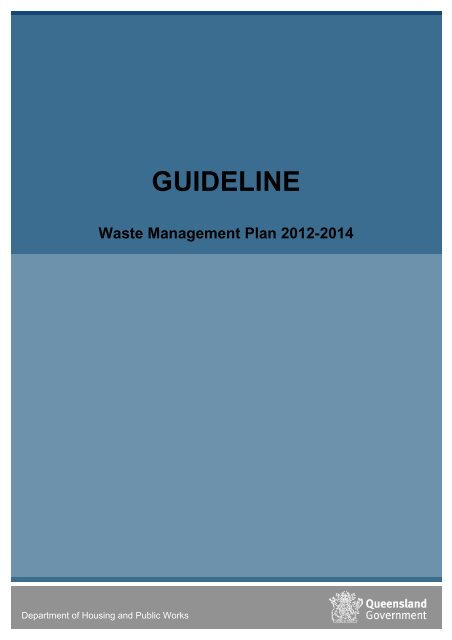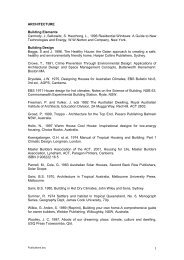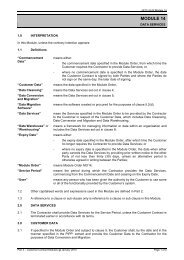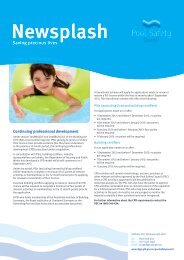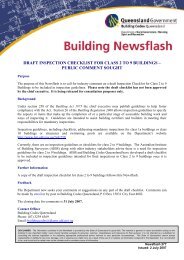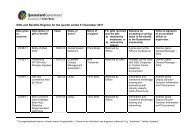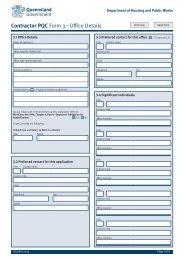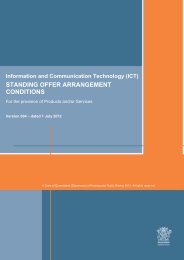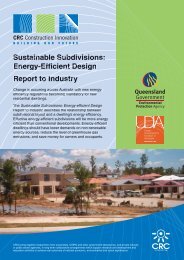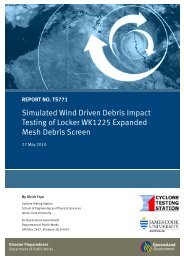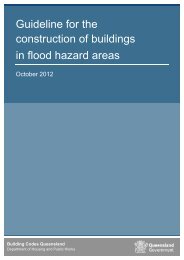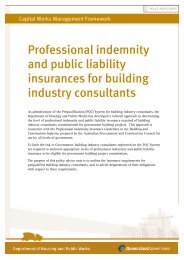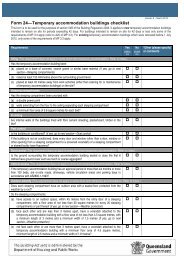Guideline to the Waste Management Plan - Department of Housing ...
Guideline to the Waste Management Plan - Department of Housing ...
Guideline to the Waste Management Plan - Department of Housing ...
Create successful ePaper yourself
Turn your PDF publications into a flip-book with our unique Google optimized e-Paper software.
GUIDELINE<br />
<strong>Waste</strong> <strong>Management</strong> <strong>Plan</strong> 2012-2014<br />
<strong>Department</strong> <strong>of</strong> <strong>Housing</strong> and Public Works
<strong>Guideline</strong> <strong>to</strong> <strong>Waste</strong> <strong>Management</strong> <strong>Plan</strong> 2012-2014 Page 2 <strong>of</strong> 16<br />
<strong>Guideline</strong> <strong>to</strong> <strong>the</strong> <strong>Waste</strong> <strong>Management</strong> <strong>Plan</strong><br />
Contents<br />
page<br />
1. Purpose <strong>of</strong> <strong>Guideline</strong> 3<br />
2. Aim <strong>of</strong> <strong>the</strong> <strong>Waste</strong> <strong>Management</strong> <strong>Plan</strong> 3<br />
3. Legislative Basis for <strong>Waste</strong> <strong>Management</strong> 3<br />
4. Principles <strong>of</strong> <strong>Waste</strong> <strong>Management</strong> 3<br />
5. <strong>Waste</strong> <strong>Management</strong> in Practice 4<br />
6. The <strong>Waste</strong> <strong>Management</strong> <strong>Plan</strong> 5<br />
7. Responsibilities <strong>of</strong> Service Areas 5<br />
8. Reporting 6<br />
9. Direc<strong>to</strong>r-General Approval 7<br />
Appendices<br />
1. Summary: Responsibilities <strong>of</strong> Service Areas<br />
2. Simple example <strong>of</strong> a <strong>Waste</strong> <strong>Management</strong> <strong>Plan</strong><br />
3. Glossary <strong>of</strong> Terms<br />
Technical Services April 2013
<strong>Guideline</strong> <strong>to</strong> <strong>Waste</strong> <strong>Management</strong> <strong>Plan</strong> 2012-2014 Page 3 <strong>of</strong> 16<br />
1 Purpose <strong>of</strong> <strong>Guideline</strong><br />
This guideline provides background and explana<strong>to</strong>ry information <strong>to</strong> <strong>the</strong> <strong>Department</strong> <strong>of</strong><br />
<strong>Housing</strong> and Public Works <strong>Waste</strong> <strong>Management</strong> <strong>Plan</strong> 2012-2014.<br />
2 Aim <strong>of</strong> <strong>the</strong> <strong>Waste</strong> <strong>Management</strong> <strong>Plan</strong><br />
The department’s <strong>Waste</strong> <strong>Management</strong> <strong>Plan</strong> aims <strong>to</strong>:<br />
• foster a culture that recognises ‘waste’ as a resource and recognises <strong>the</strong> importance<br />
<strong>of</strong> resource recovery ei<strong>the</strong>r by avoidance, reduction, reuse, or recycling <strong>of</strong> unwanted<br />
or surplus materials and products;<br />
• foster a consistent philosophy and approach across <strong>the</strong> diverse service areas <strong>of</strong> <strong>the</strong><br />
<strong>Department</strong> <strong>of</strong> <strong>Housing</strong> and Public Works; and<br />
• comply with Queensland legislation and government policy (as outlined below).<br />
3 Legislative Basis for <strong>Waste</strong> <strong>Management</strong><br />
The <strong>Waste</strong> Reduction and Recycling Act 2011 (<strong>the</strong> Act), which received Royal Assent on<br />
28 Oc<strong>to</strong>ber 2011, imposed a requirement on each Queensland government department <strong>to</strong><br />
develop a new waste reduction and recycling plan and <strong>to</strong> report on waste management<br />
achievements under <strong>the</strong> plan.<br />
Previously, <strong>the</strong> obligation on a department <strong>to</strong> develop and implement a waste management<br />
plan was embedded in Sections 35 <strong>to</strong> 40 <strong>of</strong> <strong>the</strong> Environmental Protection (<strong>Waste</strong><br />
<strong>Management</strong>) Policy 2000 (<strong>the</strong> Policy), which was subordinate legislation <strong>to</strong> <strong>the</strong><br />
Environmental Protection Act 1994. The Policy was repealed when <strong>the</strong> new Act was<br />
introduced.<br />
However, due <strong>to</strong> major proposed amendments <strong>to</strong> <strong>the</strong> Act and <strong>to</strong> Queensland’s <strong>Waste</strong><br />
Reduction and Recycling Strategy 2010-2020 which supports it, <strong>the</strong> deadline for <strong>the</strong><br />
development <strong>of</strong> a new waste reduction and recycling plan (originally intended <strong>to</strong> be 1<br />
December 2012) has been deferred until 1 July 2014 and <strong>the</strong> new reporting requirements<br />
deferred until August 2015.<br />
In <strong>the</strong> interim, transitional arrangements are in place whereby <strong>the</strong> requirements for <strong>the</strong><br />
development <strong>of</strong> a waste plan and for reporting on waste management under <strong>the</strong> previous<br />
Policy remain in place until 30 June 2014.<br />
4 Principles <strong>of</strong> <strong>Waste</strong> <strong>Management</strong><br />
The waste management hierarchy outlines waste management practices <strong>to</strong> achieve <strong>the</strong><br />
best environmental outcome, listed in <strong>the</strong> preferred order <strong>of</strong> adoption:<br />
• waste avoidance - practices which prevent <strong>the</strong> generation <strong>of</strong> waste al<strong>to</strong>ge<strong>the</strong>r<br />
• waste reduction - practices which reduce waste produced<br />
• waste segregation – separation <strong>of</strong> wastes making <strong>the</strong>m useable or less difficult <strong>to</strong><br />
dispose <strong>of</strong><br />
• waste reuse - direct reuse <strong>of</strong> waste materials for <strong>the</strong> same grade <strong>of</strong> use<br />
Technical Services April 2013
<strong>Guideline</strong> <strong>to</strong> <strong>Waste</strong> <strong>Management</strong> <strong>Plan</strong> 2012-2014 Page 4 <strong>of</strong> 16<br />
• waste recycling or reclamation – use <strong>of</strong> valuable components <strong>of</strong> waste in o<strong>the</strong>r<br />
processes.<br />
5 <strong>Waste</strong> <strong>Management</strong> in Practice<br />
The following examples <strong>of</strong> good practice illustrate <strong>the</strong> above principles.<br />
Office practices applicable <strong>to</strong> individual service areas <strong>of</strong> <strong>the</strong> department include:<br />
Avoidance:<br />
• Printing documents double-sided <strong>to</strong> reduce paper usage<br />
• Using email and o<strong>the</strong>r electronic means <strong>of</strong> communication and s<strong>to</strong>rage <strong>to</strong> minimise<br />
use <strong>of</strong> hard copies where practical and cost effective while being in accordance with<br />
departmental records management policy<br />
• Separating recyclable materials from general waste <strong>to</strong> reduce quantity going <strong>to</strong><br />
landfill<br />
• Purchasing/using printers/pho<strong>to</strong>copiers with duplexing capability where practicable<br />
• Fitting movement sensor switches <strong>to</strong> lighting <strong>to</strong> reduce energy consumption<br />
• Installing energy efficient lighting systems<br />
• Switching <strong>of</strong>f non-essential electrical equipment, e.g. PCs, at <strong>the</strong> end <strong>of</strong> <strong>the</strong> day<br />
• Using recycled paper <strong>to</strong> preserve natural resources.<br />
Reuse:<br />
• Using waste blank paper for note taking in place <strong>of</strong> new note pads<br />
• Reusing folders, file covers and similar items.<br />
Recycling:<br />
• Recycling <strong>to</strong>ner cartridges for pho<strong>to</strong>copiers and printers (use <strong>of</strong> refillable <strong>to</strong>ner<br />
cartridges is inadvisable if <strong>the</strong> practice voids manufacturer’s warranty)<br />
• Placing recycling receptacles at desks, printers, copiers<br />
• Placing bins in tea rooms (or o<strong>the</strong>r designated locations) for recycling <strong>of</strong> empty<br />
glass, steel, aluminium, plastic products<br />
• Arranging for packaging (eg pallets, car<strong>to</strong>ns, etc) <strong>to</strong> be recycled by relevant<br />
organisations.<br />
Technical Services April 2013
<strong>Guideline</strong> <strong>to</strong> <strong>Waste</strong> <strong>Management</strong> <strong>Plan</strong> 2012-2014 Page 5 <strong>of</strong> 16<br />
Specialist practices<br />
Apart from <strong>the</strong> <strong>of</strong>fice practices which apply <strong>to</strong> all service areas <strong>of</strong> <strong>the</strong> department, <strong>the</strong>re are<br />
also more specialist measures which are managed by relevant service areas in accordance<br />
with <strong>the</strong>ir core activities. Some examples are:<br />
Avoidance:<br />
• Managing work and disposal practices for hazardous materials, for example<br />
managing asbes<strong>to</strong>s-containing materials in accordance with whole-<strong>of</strong>-Government<br />
Asbes<strong>to</strong>s <strong>Management</strong> and Control Policy for Government Buildings - QBuild,<br />
Project Services (Building and Asset Services after 1 July 2013), Technical Services<br />
• Promoting <strong>the</strong> use <strong>of</strong> ecologically sustainable fit out guidelines in all <strong>of</strong>fice fi<strong>to</strong>uts –<br />
Accommodation Office<br />
• Recycling or reuse <strong>of</strong> surplus materials on construction/demolition sites – Project<br />
Services, QBuild (Building and Asset Services after 1 July 2013).<br />
Reuse:<br />
• Composting green waste generated at nurseries for use on outdoor landscaped<br />
areas – QBuild (Building and Asset Services after 1 July 2013)<br />
• Managing reuse <strong>of</strong> surplus materials on construction/demolition sites – Project<br />
Services, QBuild (Building and Asset Services after 1 July 2013).<br />
Recycling:<br />
• Managing recycling <strong>of</strong> surplus materials on construction/demolition sites – Project<br />
Services, QBuild (Building and Asset Services after 1 July 2013)<br />
• Promoting specific recycling initiatives – Accommodation Office, Project Services,<br />
QBuild (Building and Asset Services after 1 July 2013), Technical Services,<br />
QGCPO.<br />
6 The <strong>Waste</strong> <strong>Management</strong> <strong>Plan</strong><br />
The <strong>Waste</strong> <strong>Management</strong> <strong>Plan</strong> 2012-2014 is based around five main objectives, with each<br />
objective having a small number <strong>of</strong> strategies <strong>to</strong> guide approaches <strong>to</strong> achieving those<br />
objectives.<br />
The <strong>Plan</strong> acts as a concise generic template <strong>to</strong> which fur<strong>the</strong>r detail can be added <strong>to</strong> form a<br />
specific waste management action plan tailored <strong>to</strong> <strong>the</strong> core functions <strong>of</strong> an individual<br />
service area if required. Each strategy can be fur<strong>the</strong>r elaborated upon by specific activities,<br />
as illustrated by a Service Area <strong>Waste</strong> <strong>Management</strong> Action <strong>Plan</strong> template provided as an<br />
appendix <strong>to</strong> <strong>the</strong> <strong>Waste</strong> <strong>Management</strong> <strong>Plan</strong>.<br />
7 Responsibilities <strong>of</strong> Service Areas<br />
Generally, each individual service area in <strong>the</strong> department is required <strong>to</strong> moni<strong>to</strong>r and record<br />
its own waste management activities in accordance with <strong>the</strong> objectives and strategies<br />
outlined in <strong>the</strong> departmental <strong>Waste</strong> <strong>Management</strong> <strong>Plan</strong>.<br />
A table summarising <strong>the</strong> responsibilities <strong>of</strong> individual service areas for each strategy within<br />
each objective as per <strong>the</strong> <strong>Waste</strong> <strong>Management</strong> <strong>Plan</strong> is provided as Appendix 1.<br />
Technical Services April 2013
<strong>Guideline</strong> <strong>to</strong> <strong>Waste</strong> <strong>Management</strong> <strong>Plan</strong> 2012-2014 Page 6 <strong>of</strong> 16<br />
It is <strong>the</strong> responsibility <strong>of</strong> ALL individual service areas <strong>to</strong> contribute <strong>to</strong> <strong>the</strong> management <strong>of</strong><br />
standard <strong>of</strong>fice waste by adopting basic <strong>of</strong>fice practices or procedures (as in Section 5<br />
above) with <strong>the</strong> aim <strong>of</strong> minimising <strong>the</strong> use <strong>of</strong> <strong>of</strong>fice resources and energy and optimising<br />
recovery <strong>of</strong> resources. A common-sense approach should be taken <strong>to</strong> focus primarily on<br />
readily available, practical and cost-effective measures <strong>to</strong> minimise <strong>of</strong>fice waste. The<br />
Accommodation Office has ultimate responsibility for <strong>of</strong>fice waste management.<br />
With respect <strong>to</strong> specialist practices within <strong>the</strong> department which generate non-<strong>of</strong>fice waste,<br />
relevant service areas have a responsibility <strong>to</strong> ensure that <strong>the</strong>se wastes also are minimised.<br />
These areas include construction and demolition waste (QBuild and Project Services<br />
[Building and Asset Services after 1 July 2013]), and vehicles (QFleet).<br />
In view <strong>of</strong> <strong>the</strong> diversity <strong>of</strong> operational activities carried out over a range <strong>of</strong> service areas in<br />
this department, <strong>the</strong>re will be differing emphases placed on various objectives and<br />
strategies depending on <strong>the</strong> core activities <strong>of</strong> <strong>the</strong> individual service area. Reporting on<br />
waste management activities is <strong>the</strong> responsibility <strong>of</strong> <strong>the</strong> Executive Direc<strong>to</strong>r, General<br />
Manager, Direc<strong>to</strong>r or equivalent Head <strong>of</strong> an individual service area, subject <strong>to</strong> endorsement<br />
by <strong>the</strong> relevant Deputy Direc<strong>to</strong>r-General or Assistant Direc<strong>to</strong>r-General.<br />
A template is provided as an appendix <strong>to</strong> <strong>the</strong> <strong>Waste</strong> <strong>Management</strong> <strong>Plan</strong> 2012-2014. This<br />
provides a suggested framework for recording waste reduction activities, although its use is<br />
discretionary since it may not be readily applicable <strong>to</strong> all service areas.<br />
For reference, a simple example <strong>of</strong> a Service Area <strong>Waste</strong> <strong>Management</strong> Action <strong>Plan</strong><br />
(Service Area XX) showing sample entries applicable <strong>to</strong> <strong>of</strong>fice waste is provided as<br />
Appendix 2. Not every strategy will apply equally <strong>to</strong> every service area, and for some<br />
strategies a ‘not applicable’ entry is appropriate.<br />
Given that departments have a future requirement <strong>to</strong> measure <strong>the</strong>ir performance <strong>of</strong> waste<br />
reduction under <strong>the</strong> <strong>Waste</strong> Reduction and Recycling Act 2011, service areas are<br />
encouraged <strong>to</strong> use quantitative measures where practicable or plan <strong>to</strong> introduce <strong>the</strong>se in<br />
<strong>the</strong> near future where possible.<br />
8 Reporting<br />
Each service area is expected <strong>to</strong> provide input <strong>to</strong> <strong>the</strong> department’s achievements with<br />
respect <strong>to</strong> waste management annually by providing a summary <strong>of</strong> waste reduction<br />
practices and initiatives <strong>to</strong> <strong>the</strong>ir relevant Office <strong>of</strong> Deputy Direc<strong>to</strong>r-General or Assistant<br />
Direc<strong>to</strong>r-General by late June each year for approval and forwarding <strong>to</strong> Technical Services<br />
by 30 June for collation.<br />
Technical Services will <strong>the</strong>n prepare a departmental waste management report <strong>to</strong> be<br />
forwarded <strong>to</strong> Communication Services for inclusion in <strong>the</strong> department’s Annual Report in<br />
accordance with <strong>the</strong> department’s legislative obligations.<br />
Technical Services April 2013
<strong>Guideline</strong> <strong>to</strong> <strong>Waste</strong> <strong>Management</strong> <strong>Plan</strong> 2012-2014 Page 7 <strong>of</strong> 16<br />
9 Direc<strong>to</strong>r-General Approval<br />
Neil Castles Date: 29 April 2013<br />
Direc<strong>to</strong>r-General<br />
Technical Services April 2013
<strong>Guideline</strong> <strong>to</strong> <strong>Waste</strong> <strong>Management</strong> <strong>Plan</strong> 2012-2014 Page 8 <strong>of</strong> 16<br />
Appendix 1<br />
SUMMARY: RESPONSIBILITIES OF SERVICE AREAS<br />
The following table provides a summary <strong>of</strong> <strong>the</strong> responsibility <strong>of</strong> service areas for each<br />
strategy within each objective as per <strong>the</strong> <strong>Waste</strong> <strong>Management</strong> <strong>Plan</strong>.<br />
Objective Strategy Responsible<br />
Service Area<br />
Notes<br />
Compliance<br />
Awareness <strong>of</strong><br />
obligations<br />
Technical<br />
Services<br />
Promotion<br />
Develop waste<br />
management strategies<br />
and summaries<br />
All<br />
A requirement for individual<br />
service areas on an annual<br />
basis, usually for <strong>the</strong> year<br />
<strong>to</strong> 30 June. The initial<br />
summary due late June<br />
2013 will be for <strong>the</strong><br />
shortened period January<br />
2013 <strong>to</strong> 30 June 2013.<br />
Moni<strong>to</strong>r and review<br />
strategies, practices,<br />
systems<br />
All<br />
A process usually carried<br />
out at <strong>the</strong> end <strong>of</strong> a financial<br />
year guided by feedback<br />
on what is or is not<br />
practical <strong>to</strong> achieve<br />
Information<br />
Collect information<br />
All<br />
This refers <strong>to</strong> information<br />
collected during <strong>the</strong><br />
relevant reporting period<br />
Moni<strong>to</strong>r progress<br />
All<br />
-<br />
Review information;<br />
use quantitative<br />
information where<br />
possible<br />
All<br />
A process most likely done<br />
at <strong>the</strong> end <strong>of</strong> <strong>the</strong> reporting<br />
period (i.e. June) based on<br />
experience <strong>of</strong> what<br />
information can or cannot<br />
be readily obtained<br />
<strong>Waste</strong><br />
reduction<br />
Promote reuse and/or<br />
recycling <strong>of</strong> project<br />
waste<br />
Project<br />
Services 1<br />
QBuild 1<br />
PMO<br />
Onsite management and<br />
reporting processes <strong>to</strong> be<br />
introduced aiming <strong>to</strong><br />
measure project<br />
construction waste<br />
avoidance/recycling/reuse<br />
Technical Services April 2013
<strong>Guideline</strong> <strong>to</strong> <strong>Waste</strong> <strong>Management</strong> <strong>Plan</strong> 2012-2014 Page 9 <strong>of</strong> 16<br />
Objective Strategy Responsible<br />
Service Area<br />
Notes<br />
for project activity for<br />
DHPW owned or controlled<br />
assets in <strong>the</strong> year <strong>to</strong> 30<br />
June 20yy<br />
Recycling <strong>of</strong>fice<br />
materials<br />
Accommodation<br />
Office<br />
QBuild 1<br />
All<br />
Accommodation Office is<br />
working with QBuild <strong>to</strong><br />
improve processes for<br />
capture <strong>of</strong> <strong>of</strong>fice waste<br />
information, including<br />
component <strong>of</strong> recycled<br />
waste diverted from landfill.<br />
Recycling all/specialist<br />
assets<br />
Project<br />
Services 1<br />
Construction materials;<br />
vehicles; <strong>of</strong>fice equipment<br />
QBuild 1<br />
PMO<br />
QGCPO<br />
Accommodation<br />
Office<br />
Awareness<br />
Communication<br />
All<br />
Appropriate communication<br />
measures<br />
Moni<strong>to</strong>r, coordinate<br />
All<br />
-<br />
Technical<br />
Services<br />
Research and<br />
development<br />
Initiatives<br />
Project<br />
Services 1<br />
-<br />
QBuild 1<br />
PMO<br />
Industry relations<br />
Project<br />
Services 1<br />
-<br />
QBuild 1<br />
PMO<br />
1<br />
Building and Asset Services (BAS) from 1 July 2013.<br />
Technical Services April 2013
<strong>Guideline</strong> <strong>to</strong> <strong>Waste</strong> <strong>Management</strong> <strong>Plan</strong> 2012-2014 Page 10 <strong>of</strong> 16<br />
Appendix 2<br />
EXAMPLE<br />
WASTE MANAGEMENT ACTION PLAN<br />
Technical Services April 2013
<strong>Guideline</strong> <strong>to</strong> <strong>Waste</strong> <strong>Management</strong> <strong>Plan</strong> 2012-2014 Page 11 <strong>of</strong> 16<br />
<strong>Department</strong> <strong>of</strong> <strong>Housing</strong> and Public Works<br />
Service Area XX<br />
<strong>Waste</strong> <strong>Management</strong> Action<br />
<strong>Plan</strong><br />
June 20yy<br />
Technical Services April 2013
<strong>Guideline</strong> <strong>to</strong> <strong>Waste</strong> <strong>Management</strong> <strong>Plan</strong> 2012-2014 Page 12 <strong>of</strong> 16<br />
TYPE EXAMPLE FOR AN ADMINISTRATIVE SERVICE AREA (OFFICE FUNCTIONS)<br />
DHPW – Service Area XX <strong>Waste</strong> <strong>Management</strong> Action <strong>Plan</strong><br />
<strong>Department</strong>al Objective 1.<br />
Compliance with current whole-<strong>of</strong>-Government waste management legislation and policy<br />
Strategy Activities Resources Target Timeframe Performance<br />
1.1 Promote awareness<br />
<strong>of</strong> waste management<br />
obligations<br />
1.1.1 - - - - -<br />
1.1.2<br />
1.1.3<br />
1.2 Develop waste<br />
management strategies<br />
and summaries<br />
1.2.1 Strategy<br />
development<br />
Manager in<br />
conjunction with<br />
designated admin<br />
<strong>of</strong>ficer<br />
2012/2013 Completion<br />
1.2.2 Strategy<br />
implementation<br />
All<br />
By end June<br />
2013<br />
Completion<br />
1.2.3<br />
1.3 Moni<strong>to</strong>r and review<br />
strategies, practices,<br />
procedures and/or<br />
systems<br />
1.3.1 Moni<strong>to</strong>ring program Manager in<br />
conjunction with<br />
designated admin<br />
<strong>of</strong>ficer<br />
Ongoing <strong>to</strong><br />
June 2013<br />
Completion<br />
1.3.2 Review Manager in<br />
conjunction with<br />
designated admin<br />
<strong>of</strong>ficer<br />
June 2013<br />
Completion<br />
1.3.3<br />
Technical Services April 2013
<strong>Guideline</strong> <strong>to</strong> <strong>Waste</strong> <strong>Management</strong> <strong>Plan</strong> 2012-2014 Page 13 <strong>of</strong> 16<br />
DHPW – Service Area XX <strong>Waste</strong> <strong>Management</strong> Action <strong>Plan</strong><br />
<strong>Department</strong>al Objective 2.<br />
To collect and assess appropriate information and support continuous improvement<br />
Strategy Activities Resources Target Timeframe Performance<br />
2.1 Collect baseline<br />
waste management<br />
information deemed<br />
appropriate and<br />
practicable<br />
2.1.1 <strong>Plan</strong> information<br />
collection<br />
Manager in<br />
conjunction with<br />
designated admin<br />
<strong>of</strong>ficer<br />
2.1.2 Collect information Designated admin<br />
<strong>of</strong>ficer/all<br />
ASAP in 2012-<br />
13 year<br />
Ongoing <strong>to</strong><br />
June 2013<br />
Completion <strong>of</strong><br />
plan<br />
Completion<br />
2.1.3<br />
2.2 Moni<strong>to</strong>r progress over<br />
time and report on<br />
performance<br />
2.2.1 Moni<strong>to</strong>ring program Manager in<br />
conjunction with<br />
designated admin<br />
<strong>of</strong>ficer<br />
Ongoing or at<br />
agreed intervals<br />
<strong>to</strong> June 2013<br />
Completion<br />
2.2.2<br />
2.2.3<br />
2.3 Regularly review<br />
development <strong>of</strong><br />
information collection and<br />
analysis while committing<br />
<strong>to</strong> <strong>the</strong> use <strong>of</strong> quantitative<br />
information where<br />
possible<br />
2.3.1 Review Manager in<br />
conjunction with<br />
designated admin<br />
<strong>of</strong>ficer<br />
2.3.2<br />
2.3.3<br />
June 2013<br />
Completion<br />
Technical Services April 2013
<strong>Guideline</strong> <strong>to</strong> <strong>Waste</strong> <strong>Management</strong> <strong>Plan</strong> 2012-2014 Page 14 <strong>of</strong> 16<br />
DHPW – Service Area XX <strong>Waste</strong> <strong>Management</strong> Action <strong>Plan</strong><br />
<strong>Department</strong>al Objective 3.<br />
To reduce waste generation and optimise resource recovery<br />
Strategy Activities Resources Target Timeframe Performance<br />
3.1 Actively promote<br />
reduction <strong>of</strong> construction<br />
and demolition waste on<br />
DPW controlled projects<br />
3.1.1 N/A - -- - -<br />
3.1.2<br />
3.1.3<br />
3.2 Promote recycling <strong>of</strong><br />
<strong>of</strong>fice equipment, <strong>of</strong>fice<br />
materials, paper and<br />
miscellaneous waste<br />
3.2.1 Meeting agenda<br />
item<br />
3.2.2 Double sided<br />
printing<br />
Manager/designated<br />
admin <strong>of</strong>ficer/all<br />
All staff<br />
Regular<br />
agenda<br />
item<br />
Reduce<br />
paper use<br />
Fortnightly<br />
update<br />
Ongoing<br />
Completion<br />
Reduction in<br />
paper use<br />
3.2.3 Toner cartridges<br />
recycled<br />
Relevant staff All recycled Ongoing All recycled<br />
3.2.4 Recycling bins<br />
usage<br />
All staff<br />
Greater use<br />
<strong>of</strong> recycling<br />
bins<br />
Ongoing<br />
Increased use <strong>of</strong><br />
recycling bins<br />
3.3 Promote recycling <strong>of</strong> 3.3.1 N/A - - - -<br />
specialist equipment and<br />
assets used <strong>to</strong> support<br />
service delivery where<br />
appropriate<br />
3.3.2<br />
3.3.3<br />
Technical Services April 2013
<strong>Guideline</strong> <strong>to</strong> <strong>Waste</strong> <strong>Management</strong> <strong>Plan</strong> 2012-2014 Page 15 <strong>of</strong> 16<br />
DHPW - Service Area XX <strong>Waste</strong> <strong>Management</strong> Action <strong>Plan</strong><br />
<strong>Department</strong>al Objective 4.<br />
To increase staff awareness and knowledge <strong>of</strong> waste management principles and best practices<br />
Strategy Activities Resources Target Timeframe Performance<br />
4.1 Raise awareness<br />
through presentations,<br />
electronic<br />
communications and<br />
updates on waste<br />
management issues<br />
4.1.1 Fortnightly<br />
email<br />
4.1.2<br />
4.1.3<br />
Manager or<br />
designated admin<br />
<strong>of</strong>ficer<br />
All staff Fortnightly Emails read and<br />
acted on where<br />
possible<br />
4.2 Moni<strong>to</strong>r and where<br />
appropriate coordinate<br />
department-wide<br />
awareness and<br />
knowledge activities and<br />
initiatives<br />
4.2.1 N/A - - - -<br />
4.2.2<br />
4.2.3<br />
<strong>Department</strong>al Objective 5.<br />
To explore improved waste management opportunities through applied research and development<br />
Strategy Activities Resources Target Timeframe Performance<br />
5.1 Pursue initiatives<br />
which encourage DPW<br />
clients <strong>to</strong> improve<br />
waste management<br />
associated with <strong>the</strong>ir<br />
projects<br />
5.1.1 N/A - - - -<br />
5.1.2<br />
5.1.3 .<br />
5.2 Foster relationships 5.2.1 N/A - - - -<br />
with <strong>the</strong> recycling<br />
industry <strong>to</strong> moni<strong>to</strong>r<br />
industry initiatives and<br />
developments<br />
5.2.2<br />
5.2.3<br />
Technical Services April 2013
<strong>Guideline</strong> <strong>to</strong> <strong>Waste</strong> <strong>Management</strong> <strong>Plan</strong> 2012-2014 Page 16 <strong>of</strong> 16<br />
Appendix 3<br />
GLOSSARY OF TERMS<br />
Best practice: A way or method <strong>of</strong> accomplishing a business function or process that is<br />
considered <strong>to</strong> be superior <strong>to</strong> all o<strong>the</strong>r known methods.<br />
Hazardous materials: means any liquid and non-liquid wastes (i.e. gas, liquid or solid) formally<br />
defined as ‘hazardous materials’ in section 12 <strong>of</strong> <strong>the</strong> Dangerous Goods Safety <strong>Management</strong> Act<br />
2001 (Qld) and exhibit one or more <strong>of</strong> <strong>the</strong> following hazardous characteristics: <strong>to</strong>xicity,<br />
flammability,eactivity and/or corrosiveness.<br />
Recycling: is a process, by which waste material is collected, sorted, and <strong>the</strong>n reprocessed or<br />
remanufactured <strong>to</strong> make a new product.<br />
Re-use: is a process by which waste, o<strong>the</strong>rwise destined for landfill or destruction, is cleaned or<br />
repaired for use in a similar fashion <strong>to</strong> its original use, for <strong>the</strong> purposes <strong>of</strong> prolonging <strong>the</strong> original<br />
product lifetime.<br />
<strong>Waste</strong>: includes:<br />
(a) any substance (whe<strong>the</strong>r solid, liquid or gaseous) that is discharged, emitted or deposited in <strong>the</strong><br />
environment in such a volume, constituency or manner as <strong>to</strong> cause an alteration in <strong>the</strong><br />
environment, or<br />
(b) any discarded, rejected, unwanted, surplus or abandoned substance, or<br />
(c) any o<strong>the</strong>rwise discarded, rejected, unwanted surplus, or abandoned substance intended for<br />
sale or for recycling, reprocessing, recovery or purification by a separate operation from that<br />
which produced <strong>the</strong> substance, or<br />
(d) any substance prescribed by <strong>the</strong> regulations <strong>to</strong> be waste. A substance is not precluded from<br />
being waste merely because it can be reprocessed, re-used or recycled.<br />
ACRONYMS<br />
QGCPO – Queensland Government Chief Procurement Office<br />
Technical Services April 2013


